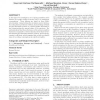Free Online Productivity Tools
i2Speak
i2Symbol
i2OCR
iTex2Img
iWeb2Print
iWeb2Shot
i2Type
iPdf2Split
iPdf2Merge
i2Bopomofo
i2Arabic
i2Style
i2Image
i2PDF
iLatex2Rtf
Sci2ools
113
click to vote
ICMI
2009
Springer
2009
Springer
Speaker change detection with privacy-preserving audio cues
In this paper we investigate a set of privacy-sensitive audio features for speaker change detection (SCD) in multiparty conversations. These features are based on three different principles: characterizing the excitation source information using linear prediction residual, characterizing subband spectral information shown to contain speaker information, and characterizing the general shape of the spectrum. Experiments show that the performance of the privacy-sensitive features is comparable or better than that of the state-of-theart full-band spectral-based features, namely, mel frequency cepstral coefficients, which suggests that socially acceptable ways of recording conversations in real-life is feasible. Categories and Subject Descriptors H.3.1 [Information Storage and Retrieval]: Content Analysis and Indexing General Terms Human Factors Keywords Modeling social interactions, Multiparty conversations, Speaker change detection, Privacy-sensitive features
Biometrics | ICMI 2009 | Multiparty Conversations | Privacy-sensitive Audio Features | Speaker Change Detection |
Related Content
| Added | 26 May 2010 |
| Updated | 26 May 2010 |
| Type | Conference |
| Year | 2009 |
| Where | ICMI |
| Authors | Sree Hari Krishnan Parthasarathi, Mathew Magimai-Doss, Daniel Gatica-Perez, Hervé Bourlard |
Comments (0)

